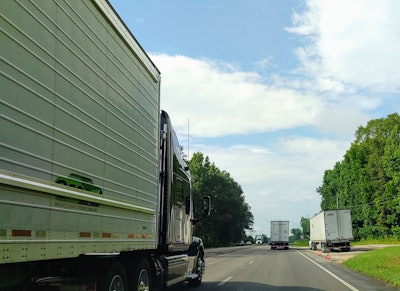
Following last week's report featuring perspectives from owner-operator panelists and OOIDA President Todd Spencer, the chair of the FMCSA's driver advisory panel, reader reaction was well-considered. Many readers stressed aspects of on-the-job conditions in trucking that most felt wouldn't be solved just by new application of old federal wage rules to interstate trucking.
Overtime pay law's application to trucking, readers said in essence, would be no panacea for driver retention within the industry itself, despite it being a primary goal of some in trucking and society at large, at least as evidenced by discussions at government's highest levels recently.
As owner-operator Neil vanKersen wrote in a thoughtful letter that is featured in full below, "We already make as much and much more than other jobs. In essence, we get overtime, it just doesn’t show in our pay breakdown. Therefore, when the overtime clause is removed [from the Fair Labor Standards Act, which exempted trucking from overtime requirements almost a century ago], companies will adjust pay so that a driver continues to gross the same per year. The only difference is now overtime will be shown."
Plenty agreed with OOIDA member vanKersen on the notion that application of overtime rules in trucking might just be a matter of accounting in the end. One noted that "at the end of the week, your pay will be exactly the same with overtime as without because they know how to use a calculator to achieve that result." The proposal, that commenter went on, "will make zero difference for driver pay."

Some commenters still brought it all back to "fair pay," which Richard Davis felt should be the biggest ask from any driver or owner-operator of their carrier or business partner. "The problem in trucking is fair pay, period," he said. "Truck drivers have been getting cheated for years out of the hours they work. They have been required or forced to work many hours sitting at a dock for free, much like slave labor."
[Related: Time-based pay might improve fairness, reduce detention]
Too many hand down explanations for giving away dock and other time, saying "it's part of the job," Davis added, or for owner-operators leased on in percentage-pay programs or working with brokers, "it's in the rate." Davis dubbed such explanations little more than a "reason or excuse not to pay drivers. ELDs have changed all that somewhat" by shining a spotlight on the basic problem of time.
Yet Davis agreed with owner-operator Doug Smith, quoted in the original story to the effect that government was going to have to force a fix to the problem.
"Places aren't going to just start paying detention (from minute number one) out of the kindness of their hearts," Davis said. "There is nothing fair about forcing drivers to work for free."
The best that government might do, in the view of many independents, is to deliver a measure of operational deregulation, as driver advisory panel member Debbie Desiderato floated in last week's story as potentially being based on a driver's safety record.
One commenter, posting only as "Phillip," took it farther. "The government will never fix the issues in trucking. The only way the government can help is to get rid of the burdensome regulations that hinder the trucking industry today. Deregulate and turn us loose and watch the issues fix themselves."
Among other viewpoints, the hard initiation period new drivers experience at many carriers, for a variety of reasons, was highlighted as a real and persistent problem. Owner-op vanKersen, who owns two trucks today and employs a driver for one of them, made mention of similar problematic dynamics in his commentary, which follows here. It started with a reference to the CNN Business retention-related commentary written under the joint byline of Secretary of Transportation Pete Buttigieg and Labor Secretary Marty Walsh, linked in last week's story.
'We are men and women who are misunderstood' --Neil vanKersen
I find it amusing that, yet again, someone so educated, has missed the mark. I can excuse Buttigieg and Walsh, though. Neither have experience in the industry. They look at numbers, spreadsheets, laws, etc. Then, by their own education and experiences, they come up with the issues.
Here’s my take on it. Some will agree, others will not.
Let’s look at other career paths. As a general rule, a high school student begins their career either by starting a blue collar job or attending college to train for a white collar job. In trucking, a driver must be 21. I understand that intrastate allows an 18-year-old driver [in most states], but in most cases insurance will not allow it, unless the company pays extra rates. Therefore, an 18-year-old driver is of no benefit. For that reason, many high school graduates decide to move on to another career. That’s nail number one.
Other career paths can continuously make mistakes and are allowed to continue in that career. Example: meteorologists almost never get the weather correct, but you see the same face on your favorite news channels for many years. A doctor operates on the wrong location -- they continue with their job. A forklift driver hits a pallet and destroys the product on it, he/she may or may not get written up, but continues their job.
As for overtime pay, we already make as much and much more than other jobs. In essence, we get overtime, it just doesn’t show in our pay breakdown. Therefore, when the overtime clause is removed, companies will adjust pay so that a driver continues to gross the same per year. The only difference is now overtime will be shown. You can also include the detention pay issue in this example and the issue of mistakes on the job. The employees on the dock might muck about, get distracted, feel overwhelmed, etc. But for whatever reason, the detention issue lays more at the feet of shippers and receivers.
The issue in trucking is the stress level. We are in the top 10 most dangerous jobs in the world. In other careers, the individual effects their own outcome. In trucking, the actions of others effect their job/career. In an accident, even if the accident is the fault of the other driver, the trucker gets CSA points for being “involved” in an accident. We spend our lives with hours and hours of sheer, mind-numbing boredom, followed by seconds of sheer terror, followed by hours and hours of mind-numbing boredom. Absence from our families. Fights with our partner at home. Death, accidents, sickness of self or loved ones.
Our personal distractions can affect our job performance and end our career. We are constantly scrutinized by FMCSA, the companies that we work for, the public, the IRS, etc.
We are constantly under the gun with time, whether it be routes we must take, hours of service regulations, appointment times, ability to find parking, and more. Traffic jams, breakdowns, accidents, and other issues are mostly beyond our control but we must still be on time and not too early.
[Related: The double-edged sword of appointment times]
The fact is we are a group of men and women trying to alleviate our stress levels and looking for the greener pastures. So we act as nomads in jobs, trying to relax. It’s not the fault of overtime, poor working conditions, the employer, or anything of the sort. I actually am leased to a company that tries its best to be compassionate to its drivers, even coddle them. Their driver turnover is much lower than any of the documented percentages.
We are men and women who are misunderstood, beaten down, abused and expected to work under any condition and do it perfectly. Overtime pay won’t fix it. Better training will help the “rookies” but not the seasoned. We just learn to deal with it over time. The old-timers, for the most part, tend not to job hop because they realize all jobs are basically the same.
Make no mistake, I applaud Buttigieg and Walsh for trying. We have been long neglected. But I really think they’re missing the mark. --Neil vanKersen, Thomasville, Pennsylvania
[Related: 'Retired, not dead': On remaining a voice for necessary change]











